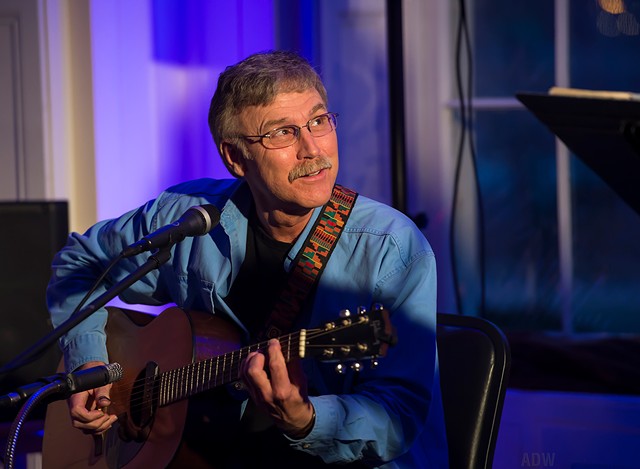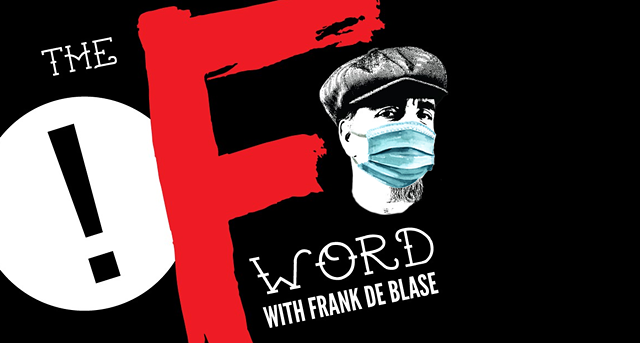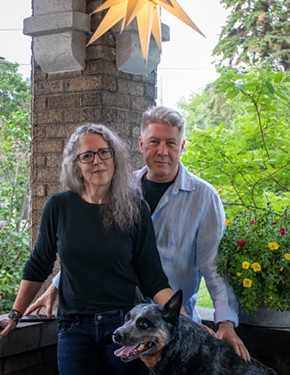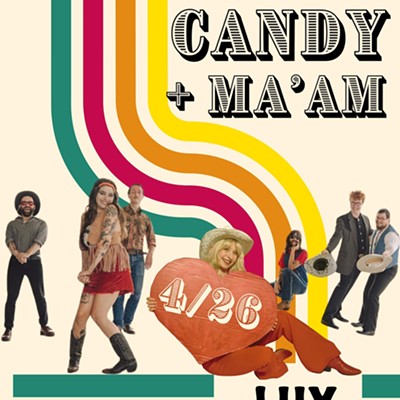Thursday, October 29, 2020
The F Word: 'Incidental' musicians
Posted By Frank De Blase on Thu, Oct 29, 2020 at 6:00 AM
COVID-19 has put a stranglehold on live music. Several words and phrases have been added to our pandemic lexicon, such as “new normal” and “physically distanced.” All musicians who perform regularly have had to reconsider their approaches — and many looking for gigs during quarantine have gotten lost in the shuffle.
But there are also those musicians who have been able to secure gigs despite scarce opportunities — those who play what New York state considers “incidental music.”
Yet another term to add to the growing pile of COVID-era jargon, “incidental music” serves as background sounds while you’re eating a physically distanced meal at your local restaurant or bar. The musical performance can’t be advertised, no tickets can be sold, and a cover isn’t charged. You’re paying for the meal — the music just happens to be playing at the time.
These rules put in place by the State Liquor Authority are meant to prevent venues from overcrowding during the pandemic and increasing the risk of transmitting the virus.
But incidental musicians have been playing long before the pandemic arrived. Such artists have always flown a bit under the radar, providing background music at coffee shops, cocktail bars, and restaurants .
Now, in an odd twist, they’re among the few musicians who can get reliable gigs. But they’ve also long been overlooked, ignored, or discounted as less relevant than other live musicians. So how do these performers feel about their “incidental” role?
Guitarist Fred Vine isn’t all that keen on the word. He sees it as a back-handed compliment.
“Well I never considered myself an incidental artist,” Vine says. “I find it rather demeaning.”
But he says it doesn’t really affect him that much. During happier, more prosperous times, he played intimate gigs at places like The Little Theatre Café, Record Archive’s Backroom Lounge, tour boat cruises on The Colonial Belle, various town events, and countless senior residential communities. He wasn’t a sell-out act, exactly, but he got reliable work with his precise, beautiful, and bluesy fingerstyle guitar.
Now in live music limbo, he’s categorized as an incidental musician, but that’s not necessarily a bad thing. Being incidental has prepared musicians like Vine for the impending adversity.
When New York state hit the pause button on live performances in March, musicians immediately lost paying gigs. Everyone whose music was conducive to an “incidental” setting went that route. Some went online to perform via livestream and play for tips. Others packed up their toys and went home. The lack of being able to play publicly or sell tickets for events has taken its toll.
“Well, it’s tough that we can’t advertise and we end up playing to just a handful of people,” says guitar player Tom Passamonte. He had a regularly scheduled gig at Pomodoro on University Avenue, with his group Special Blend serving as the house band, when COVID-19 hit and the restaurant shut down. “I really miss the connection with the audiences,” he says.
By definition, Special Blend fits the bill as an incidental act — music that is not the main attraction, but rather a compliment to dining. He plays a multitude of genres effortlessly with his trio, and that versatility has saved Special Blend during the pandemic, whereas some more conventional artists have been caught unaware. And it’s getting in the way of how we ingest our entertainment. But the artists aren’t looking for a miracle, they're looking for a gig.
Musicians understand the importance of combating the virus by keeping six feet apart and wearing masks. Still, the results are a bitter pill to swallow.
“I have a booking in November at Pane Vino on the Avenue, says Passamonte. “But nothing else yet. I have played a few outdoor things this past summer, but that’s about it. My regular Saturday gig at Woodcliff is on hold, too.”
Passamonte says he sees hope for 2021, but thinks live music won’t really return until next May.
“I’m looking forward to being busy again,” he says. “I love what I do.”
And that’s not so incidental.
Frank De Blase is CITY's music writer. He can be reached at [email protected].
Thursday, October 15, 2020
The F Word: The Big Adios
Posted By Frank De Blase on Thu, Oct 15, 2020 at 12:35 PM
You’ve heard it before from people fed up with politics: They've had enough and they’re going to leave the country.
Then, they don’t.
But local musician Sarah Long Hendershot — singer for The Jane Mutiny — and her husband of 11 years, fine arts photographer and software engineer Jones Hendershot, did. They sold their house in Irondequoit, packed their bags, and set their glims on Galicia, Spain.
Spain’s gain is Rochester’s loss. Long’s voice is riveting, as evidenced by The Jane Mutiny’s take on Bob Dylan’s “Girl From the North Country” or anything from Neil Young’s catalogue.
In addition to fronting The Jane Mutiny, Long spearheaded the wildly popular musical event “If All Rochester Wrote the Same Song.” Long has been in touch with several musicians such as Watkins and the Rapiers guitarist Steve Piper and singer-songwriter Sarah Eide, who have shown some interest in keeping the project going. And The Jane Mutiny will continue to record remotely over cyberspace, until it’s safe to travel. Then the band plans on playing in Spain.
Jones and Hendershot were at a crossroads, especially when it came to Hendershot’s reliance on insulin to maintain healthy blood-sugar levels. His body’s ability to produce the stuff was destroyed by Type 1 diabetes when he was a teenager. Without vigilant monitoring and daily insulin injections, Type 1 diabetics risk blindness, kidney disease, and death.
There are roughly 1.3 million people living with the disease in the United States and, like Hendershot, most of them are in a perpetual fight with insurance companies to cover their care.
“As we’ve gotten older, we’ve developed some uneasy feelings regarding Jones’ dependence on insulin in a for-profit healthcare system,” Long says. “We’ve been forced into the position of trusting his life to people who may not have his best interests at heart.”
They watched as the cost of insulin vials gradually crept upward from $12 to $480 over the years, and it became increasingly apparent to them that the healthcare system on which they were dependent was motivated by money rather than wellness.
And they described the system as sucking both from them as they approached their later years.
“When we were dealing with Sarah’s parents’ estate a few years ago, we began to recognize that our system is set up to extract as much money as possible from people as they approach the end of their lives,” Hendershot says. “We started discussing what our older years would look like, and we came to the difficult conclusion that we would have little control over our quality of life if we stayed in the U.S.”
Long says it was a realization that is hard for many Americans to see without stepping outside their country and looking inward.
“It’s sometimes difficult to see this from within the U.S., but when you get out from under it, the difference in general life satisfaction is astonishing,” Long says.
A new destination loomed on the horizon for the couple: España. So now it comes down to this; the big adios; the couple left the States for good on Oct. 13. Hendershot can now purchase his insulin for $20 over the counter.
Long and Hendershot both planned on being in Spain earlier, but the pandemic put everything on pause. The borders were completely closed. The Spanish consulate in New York City, on which the couple is dependent for visas, cancelled all appointments for a while.
“The visa process is incredibly involved,” Long says. “You have to be attentive to details and be very serious about giving them exactly what they are looking for.”
They put their house in Irondequoit up for sale and it sold in a day. So they kicked around, couch-surfing and staying with friends until their visas were approved and the Spanish border reopened.
The exercise of selling their home and offloading their belongings has been a gigantic leap of faith for them.
“We’ve carefully curated our lives, but we don’t want to be prisoners to our things,” Hendershot says. “So we are letting it all go for an idea that we are hoping to manifest. We want to be bold and brave and reap the rewards of that courage.”
They shopped online for a house for well over a year, and then went over to northern Spain to look at properties.
“It’s a breathtakingly beautiful place,” Long says.
The area has a water-rich microclimate that stays between 45 and 75 degrees year round. They fell in love with and purchased a property that includes a completely restored 15th-century mill. The Rio Castro runs through the backyard, and a race comes off the river and flows under the house. There’s the constant, peaceful sound of running water.
“It is primal,” Long says of the region where they’ll be living. “It’s humming with life and history. Not history like we think of it here. We’re talking 40,000-year-old petroglyphs and cave paintings. Our house is in the shadow of a 14th-century Norman castle. You can see it out the window when you’re washing the dishes.”
Long and Hendershot have specific plans for how to use the space once they move in.
“We want to have retreats at the house, doing what we’re best at — music, writing, photography,” Long says. At first the couple thought the pandemic was going to quash that idea, but now she thinks it might actually be the future of tourism.
“Restrict it to six people, practice social distancing — the possibilities are endless,” she says. “We want to incorporate the incredible culture of that region, with its Celtic and Druid roots — they call it ‘Witches’ Land’ — cook paella or pulpo in the outdoor oven, and have local musicians come and play by the riverbank.
“We’ve made many friends in Spain already — mostly artists and musicians, just like here. They are warm and welcoming. It’s a lovely, accepting culture.”
“We are excited to learn and grow from Spanish culture, and maybe introduce them to some of our Rochester strengths,” Long says. “You can put octopus on a garbage plate, right?”
Frank De Blase is CITY's music writer. He can be reached at [email protected].
Then, they don’t.
But local musician Sarah Long Hendershot — singer for The Jane Mutiny — and her husband of 11 years, fine arts photographer and software engineer Jones Hendershot, did. They sold their house in Irondequoit, packed their bags, and set their glims on Galicia, Spain.
Spain’s gain is Rochester’s loss. Long’s voice is riveting, as evidenced by The Jane Mutiny’s take on Bob Dylan’s “Girl From the North Country” or anything from Neil Young’s catalogue.
In addition to fronting The Jane Mutiny, Long spearheaded the wildly popular musical event “If All Rochester Wrote the Same Song.” Long has been in touch with several musicians such as Watkins and the Rapiers guitarist Steve Piper and singer-songwriter Sarah Eide, who have shown some interest in keeping the project going. And The Jane Mutiny will continue to record remotely over cyberspace, until it’s safe to travel. Then the band plans on playing in Spain.
Jones and Hendershot were at a crossroads, especially when it came to Hendershot’s reliance on insulin to maintain healthy blood-sugar levels. His body’s ability to produce the stuff was destroyed by Type 1 diabetes when he was a teenager. Without vigilant monitoring and daily insulin injections, Type 1 diabetics risk blindness, kidney disease, and death.
There are roughly 1.3 million people living with the disease in the United States and, like Hendershot, most of them are in a perpetual fight with insurance companies to cover their care.
“As we’ve gotten older, we’ve developed some uneasy feelings regarding Jones’ dependence on insulin in a for-profit healthcare system,” Long says. “We’ve been forced into the position of trusting his life to people who may not have his best interests at heart.”
They watched as the cost of insulin vials gradually crept upward from $12 to $480 over the years, and it became increasingly apparent to them that the healthcare system on which they were dependent was motivated by money rather than wellness.
And they described the system as sucking both from them as they approached their later years.
“When we were dealing with Sarah’s parents’ estate a few years ago, we began to recognize that our system is set up to extract as much money as possible from people as they approach the end of their lives,” Hendershot says. “We started discussing what our older years would look like, and we came to the difficult conclusion that we would have little control over our quality of life if we stayed in the U.S.”
Long says it was a realization that is hard for many Americans to see without stepping outside their country and looking inward.
“It’s sometimes difficult to see this from within the U.S., but when you get out from under it, the difference in general life satisfaction is astonishing,” Long says.
A new destination loomed on the horizon for the couple: España. So now it comes down to this; the big adios; the couple left the States for good on Oct. 13. Hendershot can now purchase his insulin for $20 over the counter.
Long and Hendershot both planned on being in Spain earlier, but the pandemic put everything on pause. The borders were completely closed. The Spanish consulate in New York City, on which the couple is dependent for visas, cancelled all appointments for a while.
“The visa process is incredibly involved,” Long says. “You have to be attentive to details and be very serious about giving them exactly what they are looking for.”
They put their house in Irondequoit up for sale and it sold in a day. So they kicked around, couch-surfing and staying with friends until their visas were approved and the Spanish border reopened.
The exercise of selling their home and offloading their belongings has been a gigantic leap of faith for them.
“We’ve carefully curated our lives, but we don’t want to be prisoners to our things,” Hendershot says. “So we are letting it all go for an idea that we are hoping to manifest. We want to be bold and brave and reap the rewards of that courage.”
They shopped online for a house for well over a year, and then went over to northern Spain to look at properties.
“It’s a breathtakingly beautiful place,” Long says.
The area has a water-rich microclimate that stays between 45 and 75 degrees year round. They fell in love with and purchased a property that includes a completely restored 15th-century mill. The Rio Castro runs through the backyard, and a race comes off the river and flows under the house. There’s the constant, peaceful sound of running water.
“It is primal,” Long says of the region where they’ll be living. “It’s humming with life and history. Not history like we think of it here. We’re talking 40,000-year-old petroglyphs and cave paintings. Our house is in the shadow of a 14th-century Norman castle. You can see it out the window when you’re washing the dishes.”
Long and Hendershot have specific plans for how to use the space once they move in.
“We want to have retreats at the house, doing what we’re best at — music, writing, photography,” Long says. At first the couple thought the pandemic was going to quash that idea, but now she thinks it might actually be the future of tourism.
“Restrict it to six people, practice social distancing — the possibilities are endless,” she says. “We want to incorporate the incredible culture of that region, with its Celtic and Druid roots — they call it ‘Witches’ Land’ — cook paella or pulpo in the outdoor oven, and have local musicians come and play by the riverbank.
“We’ve made many friends in Spain already — mostly artists and musicians, just like here. They are warm and welcoming. It’s a lovely, accepting culture.”
“We are excited to learn and grow from Spanish culture, and maybe introduce them to some of our Rochester strengths,” Long says. “You can put octopus on a garbage plate, right?”
Frank De Blase is CITY's music writer. He can be reached at [email protected].







